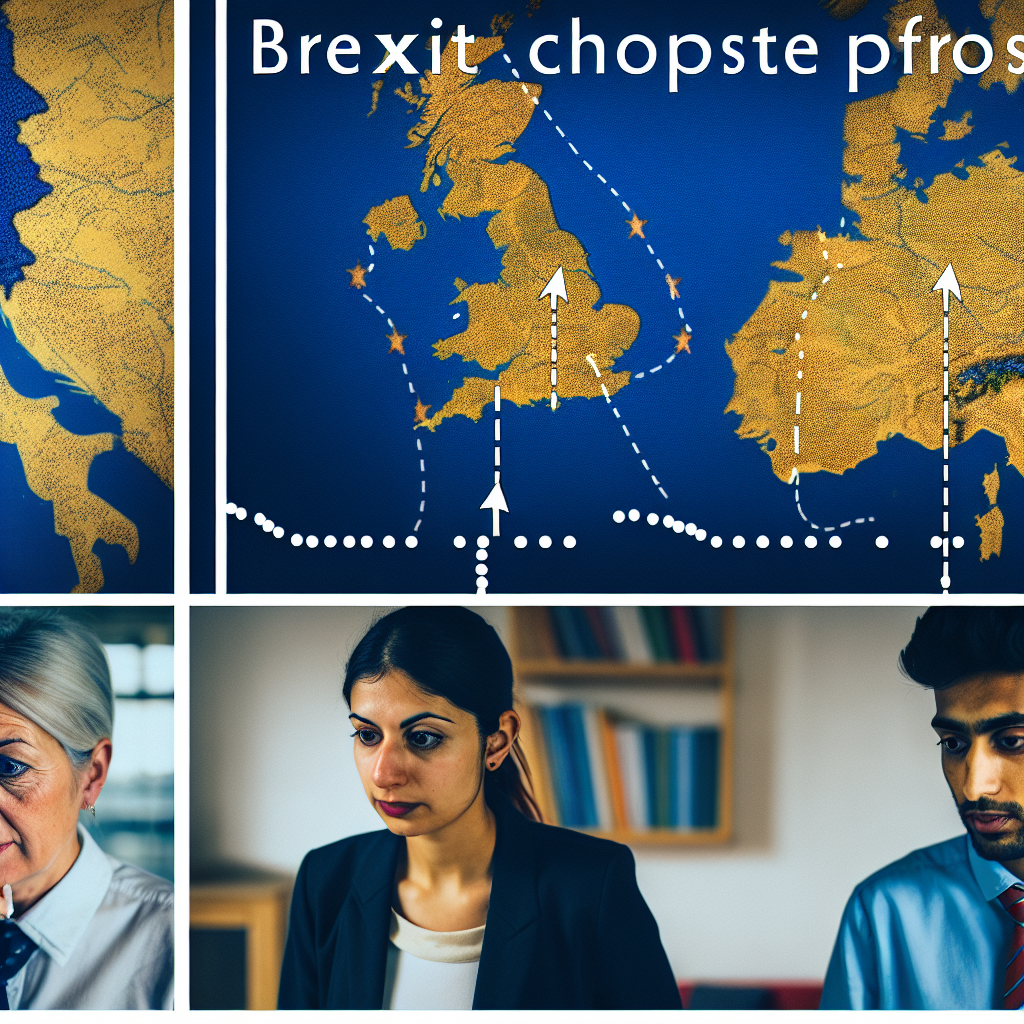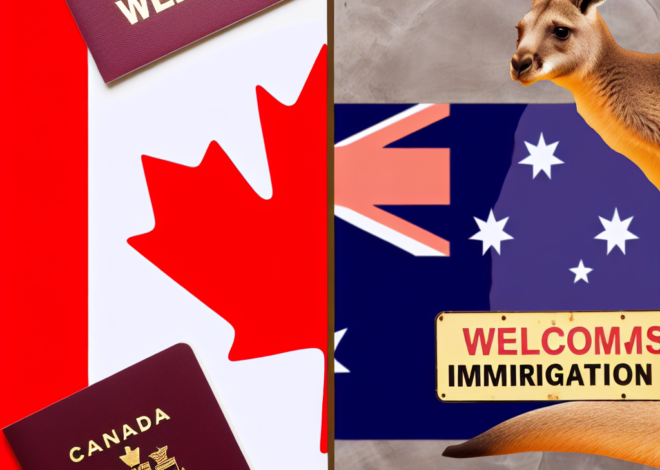
Understanding the Brexit impact on immigration
-
Table of Contents
“Brexit and Beyond: Navigating the New Norms of Immigration”
Introduction
Brexit, the United Kingdom’s decision to leave the European Union, has had profound implications on various sectors, including immigration. The departure marked a significant shift in the UK’s approach to immigration policy, primarily influenced by the desire to regain control over its borders. Prior to Brexit, the UK was part of the EU’s single market and customs union, which allowed for the free movement of people among member states. This principle enabled EU citizens to live and work in the UK and vice versa without needing visas or work permits. However, with Brexit, this arrangement came to an end, necessitating new immigration rules and regulations. Understanding the impact of Brexit on immigration involves examining changes in policy, shifts in migration patterns, and the broader socio-economic consequences for both immigrants and the native population of the UK.
Brexit’s Impact on EU and UK Immigration Policies
Understanding the Brexit impact on immigration
The decision by the United Kingdom to leave the European Union, commonly referred to as Brexit, has had profound implications for immigration policies both within the UK and across the EU. Prior to Brexit, the UK was part of the EU’s single market and customs union, which allowed for the free movement of people, goods, services, and capital. This meant that citizens from any EU country had the right to live, work, and study in any other EU country, including the UK, without needing visas or work permits.
However, with the UK’s departure from the EU on January 31, 2020, and the end of the transition period on December 31, 2020, this freedom of movement came to an abrupt end. The UK government introduced a new points-based immigration system that treats EU and non-EU citizens equally. This system prioritizes skills and talents over nationality, fundamentally changing the landscape of immigration to the UK. Skilled workers, students, and various other categories of migrants now need to meet specific criteria, such as having a job offer from an approved employer, speaking English, and meeting salary thresholds.
This shift has significant repercussions for individuals and businesses alike. For EU citizens who were used to relocating to the UK with relative ease, the new system poses additional challenges and uncertainties. They now face similar bureaucratic hurdles as their non-EU counterparts, including lengthy application processes and stringent requirements. For UK businesses, particularly those reliant on EU labor for sectors such as agriculture, healthcare, and construction, the changes necessitate adjustments in how they recruit and manage their workforce.
Conversely, the EU has also had to adapt to the absence of the UK from its membership. The loss of one of its largest member states has not only economic but also social and political ramifications, particularly in terms of movement within the bloc. EU citizens no longer have automatic rights to move to the UK for work or study, which affects individual life choices and career plans.
Moreover, the end of free movement between the UK and EU has broader implications for the handling of asylum and refugee policies. The UK is no longer part of the Dublin Regulation, which determines which EU member state is responsible for examining an application for asylum. This regulation aimed to prevent asylum seekers from submitting applications in multiple countries. Now, the UK must negotiate separate agreements on how to manage refugees and asylum seekers, a task that presents both challenges and opportunities for reforming its approach to international protection obligations.
In conclusion, Brexit has fundamentally altered the landscape of immigration policy in both the UK and the EU. The introduction of a points-based system in the UK aims to control and reduce immigration by prioritizing high-skilled workers, which marks a significant shift from the previous freedom of movement principle. For the EU, adjusting to the new dynamics without one of its largest members continues to be a complex process, influencing everything from labor markets to social cohesion. As both the UK and EU navigate these changes, the full impact of Brexit on immigration will unfold over the coming years, shaping the future demographic and economic landscape of Europe.
Changes in Work Visa Regulations Post-Brexit
Understanding the Brexit impact on immigration, particularly in the realm of work visa regulations, reveals a complex landscape of change and adaptation. The departure of the United Kingdom from the European Union marked a significant shift in the framework governing the movement of people for work purposes. This transition has profound implications not only for EU nationals wishing to work in the UK but also for UK nationals seeking employment opportunities within the EU.
Prior to Brexit, the principle of free movement allowed EU citizens to live and work in any member state without the need for a work visa. This arrangement facilitated a dynamic labor market where skills and resources could be optimally allocated across the continent. However, with the UK’s exit from the EU, this ease of movement came to an abrupt end, necessitating a new set of regulations to manage the influx and outflow of workers.
The introduction of the points-based immigration system by the UK government is a cornerstone of the post-Brexit changes. This system categorizes applicants based on skills, qualifications, salaries, and professions, prioritizing individuals who meet the specific needs of the UK labor market. For instance, the system favors scientists, engineers, academics, and other skilled professionals, reflecting the country’s strategic goals to bolster sectors deemed vital for national development.
Moreover, the new system does not differentiate between EU and non-EU citizens, which marks a significant departure from previous policies that were more lenient towards EU nationals. This uniform approach aims to attract talent from a global pool, but it also introduces additional hurdles for EU citizens who were accustomed to more straightforward entry processes. They now must navigate the complexities of point scoring and ensure they meet the stringent criteria set forth, which can be a daunting prospect for many.
For UK nationals looking to work in the EU, the situation is equally challenging. The reciprocity that allowed for easy work relocation within the EU no longer applies to them, and they must comply with varying national immigration laws of the EU member states. These laws can differ significantly, making it essential for prospective workers to thoroughly understand the specific requirements of the country they wish to work in. This fragmentation represents a considerable change from the harmonized system that once governed their mobility rights.
The impact of these changes extends beyond individual workers and affects industries that rely heavily on international talent. Sectors like healthcare, research, and technology, which traditionally benefited from the easy inflow of skilled workers, now face potential shortages and increased competition for qualified personnel. This could necessitate adjustments in recruitment strategies and potentially increase operational costs as companies might need to invest more in training and developing home-grown talent or in attracting qualified workers from outside the EU.
In conclusion, the post-Brexit alterations in work visa regulations have ushered in a new era of immigration policy that significantly affects how labor markets operate across the UK and the EU. Both regions are navigating this new reality, which requires adaptation by governments, businesses, and individuals alike. As these entities strive to adjust, the full impact of these changes will become clearer, shaping the future landscape of work and mobility in and out of the UK.
The Effect of Brexit on Student Mobility Between the UK and EU
Understanding the Brexit impact on immigration, particularly in the context of student mobility between the UK and the European Union, reveals a complex landscape of change and adaptation. Prior to Brexit, the UK was one of the most popular destinations for international students within the EU, largely due to the ease of movement afforded by EU membership and the high standard of education offered by British universities. However, the decision to leave the EU has significantly altered these dynamics.
Initially, one of the most immediate effects of Brexit on student mobility was the uncertainty it generated. Both UK and EU students were left in a state of limbo, questioning how changes in immigration policies would affect their ability to study abroad. This uncertainty was particularly pronounced immediately after the referendum and during the subsequent negotiations. As policies began to take shape, it became clear that the freedom of movement once enjoyed by UK and EU students would no longer be as straightforward.
Transitioning from this initial uncertainty, the introduction of the new points-based immigration system by the UK government marked a significant shift. This system, which came into full effect from January 2021, treats EU and non-EU citizens equally. For EU students, this meant navigating a more complex process to obtain study visas, which now required proving specific points based on skills, qualifications, and the ability to speak English. This change not only added a layer of bureaucracy to what was once an uncomplicated process but also potentially increased the costs associated with studying in the UK due to visa fees and health surcharges.
Moreover, the financial implications of Brexit have extended beyond visa-related expenses. Prior to Brexit, EU students were eligible to pay the same tuition fees as UK nationals and could access student loans and grants. Post-Brexit, EU students are generally required to pay international tuition fees, which are considerably higher than home fees. This significant increase in cost has made studying in the UK less accessible for many EU students, thereby impacting the diversity of the student body within UK universities.
Despite these challenges, it is important to recognize that the UK remains an attractive destination for students due to its prestigious academic institutions and the quality of education provided. In response to the potential decline in EU student numbers, UK universities have been proactive in creating new scholarships and bursaries specifically aimed at EU students to help mitigate the financial burden and continue to attract top talent.
Furthermore, the UK government has launched the Turing Scheme, which replaces the UK’s participation in the Erasmus+ program. This new initiative aims to provide funding for students to study and work abroad, reflecting a commitment to maintain and enhance global educational links. The scheme is global in scope, which broadens the opportunities available to UK students beyond Europe, potentially offsetting some of the impacts of reduced EU mobility.
In conclusion, while Brexit has undoubtedly complicated the landscape of student mobility between the UK and the EU, it has also prompted adaptations and innovations in the educational sector. Both the UK and EU continue to value the mutual benefits of academic exchange, and as such, are finding new ways to support international education in a post-Brexit world. The long-term effects of these changes remain to be fully seen, but they will undoubtedly continue to shape the educational experiences of future generations of students.
Long-term Consequences of Brexit on Family Reunification Laws
Understanding the Brexit impact on immigration, particularly in the context of long-term consequences on family reunification laws, requires a nuanced examination of the changes that have unfolded since the United Kingdom’s departure from the European Union. Brexit has fundamentally altered the landscape of immigration, with significant implications for individuals and families attempting to navigate these new legal terrains.
Prior to Brexit, the United Kingdom was part of the EU’s framework, which allowed for the free movement of people among member states. This policy enabled EU citizens to live and work in any member country, including the UK, without needing special visas or undergoing rigorous immigration checks. Family reunification was also straightforward under EU law, as family members of EU citizens had the right to join them in any member state under relatively lenient conditions.
However, with the UK’s exit from the EU, these privileges have ceased to apply, bringing about stringent immigration controls that now govern how non-UK nationals can enter and settle in the country. The new points-based immigration system introduced by the UK government prioritizes skills and employment over family ties. This shift marks a significant departure from the previous system, where family reunification was considerably more accessible.
The impact of these changes is profound, especially for families who were accustomed to the flexibility that EU laws provided. Under the new system, EU nationals who wish to bring family members to the UK must meet specific criteria and navigate complex bureaucratic processes. For instance, proving the financial ability to support incoming family members has become a critical requirement, alongside the need to demonstrate that relationships are genuine and subsisting. These requirements are not only stringent but also introduce a level of uncertainty and stress for families involved.
Moreover, the introduction of the EU Settlement Scheme was intended to ease the transition for EU nationals already residing in the UK. While it allows those who apply and qualify to continue living in the UK post-Brexit, the scheme does not automatically cover future family reunification. Family members of EU nationals who wish to move to the UK post-Brexit must apply through the standard immigration process, which is not only more cumbersome but also less certain in its outcome.
The long-term consequences of these changes are still unfolding, but it is clear that the impact on family life can be distressing. Families may find themselves split across borders, with some members unable to join their loved ones in the UK due to the stringent new requirements. This situation can lead to significant emotional and financial strain, as families strive to meet the government’s requirements or face prolonged separations.
Furthermore, the legal implications of Brexit on family reunification extend beyond EU nationals. The UK’s new immigration system applies globally, affecting non-EU nationals as well. This global approach means that the UK may see a decrease in its attractiveness as a destination for international talent who consider family reunification possibilities as a key factor in their relocation decisions.
In conclusion, the post-Brexit era has ushered in a new set of challenges for immigration and family reunification in the UK. The shift from an EU-centric approach to a points-based system emphasizes economic contributions over familial connections, reshaping the immigration landscape in profound ways. As families and individuals adapt to these changes, the full spectrum of their impact will continue to evolve, highlighting the complex interplay between immigration policies and family dynamics in the post-Brexit UK.



